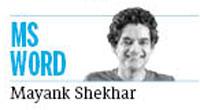15 March,2023 05:27 AM IST | Mumbai | Mayank Shekhar

A still from What’s Love Got to Do with It? (right) screenwriter Jemima Khan and director Shekhar Kapur. Pics/Twitter

It's that she was on a British Airways flight to Kenya, in 2001, travelling with family. A lunatic took over the cockpit, planning to crash that flight. Only the night before, that plane's pilot had watched a Nat Geo documentary, detailing the best form of animal combat: It's to attack the eyes.
Which is what he remembered to do, with the mentally deranged man - gouging out his eyes, swiftly dislodging him from the pilot's seat. He then whimpered to passengers on the plane that a "mad-man" had taken over, but it's all okay (now). Shortly after, he took on the more formal tone of a pilot, announcing their landing in Nairobi, soon!
Jemima already suffered from a fear of flying. She swore against it altogether after. You see this aerophobia, expressed through the male lead (charming Shazad Latif), panicking during turbulence on a plane, in the unusually multi-culti, English rom-com, What's Love Got to Do with It (opens in Indian theatres, March 17).
Only this lead character is a "British-born" (meaning, non-white), of Pakistani origin. He travels to Lahore to marry a girl of his family's choice. Jemima, 49, has written the film's screenplay, based on her time in Pakistan.
Except, those experiences involved a conspiracy to defame her in public, for allegedly smuggling out local antiques - she was debarred from entering the country, until the charges were dropped.
The target of her attack was, of course, her husband Imran, who later became Pakistan's Prime Minister. She was unable to handle his political opponents/pressures. They divorced subsequently. She left for Britain with her two kids.
Imagine absorbing such bitter life-experiences in your 20s - including living in a 20-member, deeply conservative joint family. And to mine all of it to write a warm, gentle, thoroughly romantic comedy, instead!
Distance of time surely helps. This also proves she's an artiste - not just regurgitating/journaling personal anecdotes, whether in anger, or sheer reminiscence.
In line with its intention, What's Loveâ¦, shot during the pandemic, has been rolled out by Working Title Films - easily the world's best assembly-line of western rom-coms. They made us revisit the theatrical genre, most recently, with the super-fine Ticket to Paradise (2022).
The genre evidently peaked in the early 2000s, with Working Title productions: Four Weddings and a Funeral (1994), Notting Hill (1999), Bridget Jones's Diary (2001), About A Boy (2002), Love Actually (2003)...
Also Read: What ChatGPT told me about me
All of which starred who as Hollywood's undisputed King of Romance? Hugh Grant, who was with Jemima, after Imran's divorce. They're apparently still friends.
Between the two amazing men in Jemima's life, her film's setting, ie Pakistan - Lahore seems a lot more wholesome/joyous than its dark stereotype - and the genre, ie rom-com - although more in the family-drama space - is sorted. Credibility is indelible. Helps the creative process to date right, I guess (kidding, of course)!
If anything, through the gorgeous Lily James's female lead, What's Love⦠comes across as a tender critique of a serial/Tinder dating culture.
It almost actively bats for "assisted marriage" - euphemism for âarranged marriage', which could have coercive connotations - by throwing around stats to the effect that Britain has 55 per cent divorce-rate; only 6 per cent marriages, arranged by families, break up.
Respecting a person's choice to marry who they like is obviously not under question here. Debating reasons for low divorce rates among sub-continental arranged marriages (as against âlove marriages') is not the point either.
What is? Fun conversations on a "simmering like" for someone, over "boiling (hot) love", an easygoing interplay, Emma Thompson on screen, Nitin Sawhney, Rahat Fateh Ali Khan (for music)⦠Jemima's top talent as screenwriter is evidently dialogue; some sharp lines here, and there.
The film's female protagonist is a documentary filmmaker. Her desi, BFF next-door, wants to explore suitable girls picked by his folks. Her camera follows him - for the film, within the film, "that could be Meet The Parents (First), or Love Contractuallyâ¦"
It's only while looking up more on Jemima, after watching What's Love⦠that I realised she's been a prolific journalist (The New Statesman, Vanity Fair, Vogue); and, indeed, an accomplished documentary producer/filmmaker herself (Clinton Affair, Case Against Adnan Syed).
In what could be a meta moment in this movie, the documentary director manages a decent film on love, relationships and Pakistan, but the producers back out, because the "lens is white!" Jemima's script has been directed by the Lahore-born child of India's partition, Shekhar Kapur.
For whatever reasons, I can't recall the last time I saw a film directed by Shekhar (Mr India, Bandit Queen) - was it a short segment in New York, I Love You (2008), or Four Feathers (2002); think, skipped Elizabeth: The Golden Age (2007).
What's Love⦠(2023) also means, arguably India's most talented director, has simply put together a perfectly watchable, light-weight rom-com - shedding the curse/burden of a masterpiece!
Shekhar has also directed the stupendous Shabana Azmi in the film, which might be the first time since his debut, Masoom (1983), 40 years ago. That's enough nostalgia for Indians.
Mayank Shekhar attempts to make sense of mass culture. He tweets @mayankw14
Send your feedback to mailbag@mid-day.com
The views expressed in this column are the individual's and don't represent those of the paper.